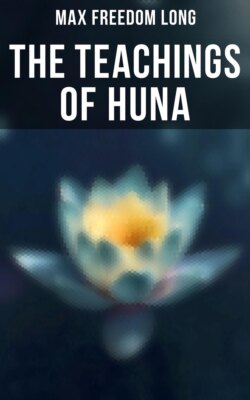Читать книгу The Teachings of Huna - Max Freedom Long - Страница 8
На сайте Литреса книга снята с продажи.
Case 3 A Professor of Biblical History Reports
ОглавлениеPreliminary Notes:
On February 21, 1935, I attended a lecture at the Los Angeles Public Library. The speaker was Dr. John G. Hill, Professor of Biblical History at the University of Southern California. His subject was "Fire-Walking." He had spent four seasons in the South Seas and illustrated his lecture with moving pictures he had taken.
He told of voyaging from Tahiti to a neighboring island, and of traveling fourteen miles overland to see a fire-walking performance. A great pit had been dug, filled with logs and stones, and a fire had been burning among them for many hours until the stones were red-hot. Invocations were recited to "Nahine (woman) of the Skies," then the performers marched around the pit and made seven crossings back and forth. Ti leaves were used in the ceremony to carry and to "dust off" the rocks.
Dr. Hill exposed much film, taking close-up pictures of the feet and hot rocks, and pictures of the group walking in single file over the stones. He showed one native who had been forced to walk the hot stones as an "ordeal" to prove his guilt or innocence of a certain charge. As he was badly burned, the natives decided that he was guilty, despite his denials, and so had not merited the protection of "Nahine of the Skies."
The ceremony over, Dr. Hill and his white companions tested the heat of the rocks, the following results being reported: Length of time possible to hold the hand at a distance of three feet from the rocks: eleven seconds. Time required for a bundle of wet, green branches to take fire when thrown on the rocks: thirteen minutes.
While the testing of the heat was going on, the head magician was inviting his guests to cross the rocks under the protection of his magic. One of the white men joined the natives who were accepting the invitation. He walked across the rocks. Dr. Hill stated that they were almost red-hot even at that time. The man's shoes were not burned in any way, nor were his feet, but, oddly enough, the intense heat burned his face so badly that it peeled a few days later.
After the lecture I joined a group gathered to hear Dr. Hill answer questions. He was asked for any possible explanation of the feat. His answer was that he was totally at a loss for an explanation. He could only guess that there might be some superior form of mental activity used—some form which could keep heat from burning. He was very positive in his refusal to accept his own guess as a fact.
The usual questions were raised as to the possibility of some "undetectable solution" being used. This, the Doctor explained, was impossible for the simple reason that the white man's shoes had not been so treated and would certainly have been ruined by the heat under ordinary circumstances.
In an endeavor to throw further light on the mystery, Dr. Hill told of another fire-walking performance which he had seen but not photographed. There a young white man, described as being "quite a mystic," avowed that if the brown men's magic would protect them, his God would also protect him. He questioned the friendly magician in charge and was laughingly told to go on across the stones without fear. Disregarding the protests of other white travelers, the young man took off shoes and socks. He approached the fire-walk with set face—evidently trying to concentrate on his task and hold his faith in readiness. He followed the magician on to the rocks and was getting on perfectly when a wild dog-fight broke out close beside the pit. For a moment he glanced aside. He lifted one foot suddenly, but his face again became set and he continued his crossing. The foot lifted was found later to have a large blister on its sole. Dr. Hill vouched for this data, but made no comment on its possible significance.
Comment:
For those who may not have seen moving pictures of fire-walking shown in 1934 news reels at theatres, I mention the following sources of photographic or written information:
The book, The Colony of Fiji, edited by A. A. Wright and published by the Government of Fiji, contains several good illustrations of fire-walking. As a commentary on the influence of the scientific attitude in so far as any official publication is concerned, we find in this book only one lone paragraph to describe the finest tourist attraction in Fiji. This paragraph gives a meager statement of the facts of fire-walking, but nothing more.
Another book more easily procured in libraries is the Seatracks of the Speejacks. In its log, which is written by Jeanne Gowen, will be found both pictures and full descriptions of the fire-magicians and their work.
In Herbert MacQuarrie's book, Tahiti Days (George H. Doran Co., 1920), an entire chapter is given over to a report on fire-walking, and there are five pictures showing the fire-walkers, crowds and pit, as well as of the actual performance.
